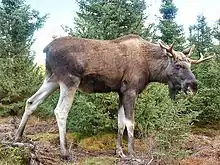moose
See also: Moose
English
WOTD – 15 October 2011

A moose.
Etymology
Earlier mus, moos, from a Northeastern Algonquian language name for the animal, such as Massachusett moos, mws, Narragansett moos or Penobscot mos (cognate to Abenaki moz), from Proto-Algonquian *mo·swa (“it strips”), referring to how a moose strips tree bark when feeding: compare Massachusett moos-u (“he strips, cuts smooth”).[1][2]
Pronunciation
- enPR: mo͞os, IPA(key): /muːs/
Audio (US) (file) Audio (AU) (file) - Rhymes: -uːs
- Homophone: mousse
Noun
moose (plural moose or (dated) mooses or (nonstandard) moosak or (humorous, nonstandard) meese)
Usage notes
- The usual plural of moose is moose; compare the names of many animals, such as deer and fish, which are also invariant. Other plurals are rare and nonstandard: mooses (with the usual English plural-forming suffix -s), meese (jocularly formed by analogy to goose → geese), moosak (presumably derived from the addition of the Abenaki plural-forming suffix -ak).[3]
Synonyms
- (largest member of the deer family (Alces alces)): elk (British), Newfoundland speed bump (Canadian, humorous)
Derived terms
- moosebird
- moose deer
- mooseknuckle
- mooselimb
- mooseling
- moosey
- moose yard
- mooseyness
Descendants
Translations
largest member of the deer family (Alces alces)
|
|
References
- Online Etymology Dictionary
- “moose” in Dictionary.com Unabridged, Dictionary.com, LLC, 1995–present.
- The living Algonquian languages, for their part, pluralize the term with their reflexes of the Algonquian plural sufix -ak, e.g. Abenaki moz, mozak.
Ojibwe
Scots

moose
Etymology
From Middle English mous, from Old English mūs, from Proto-Germanic *mūs, from Proto-Indo-European *muh₂s.
Pronunciation
- IPA(key): [mus]
This article is issued from Wiktionary. The text is licensed under Creative Commons - Attribution - Sharealike. Additional terms may apply for the media files.